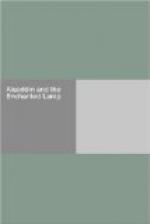[FN#639] Ca"da. Burton translates “he mounted,” apparently reading szfida for ca"da.
[FN#640] Lit. “belly " (betn); but that “breast” is meant is shown by the next line, which describes Fatimeh as finding the enchanter seated on her heart.
[FN#641] Lit. “heart” (kelb).
[FN#642] The text adds here, “she went not and came not” (la rahet wa la jaet). Burton translates, “as though she had never gone or come” and adds, in a note, by way of gloss, “i.e. as she was in her own home;” but I confess that his explanation seems to me as obscure as the text.
[FN#643] Night DLXXXVIll.
[FN#644] Keszr.
[FN#645] The first or “opening” chapter of the Koran.
[FN#646] En nas bi ’l ghewali kethir an, lit. “The folk in [things] precious (or dear or high-priced, ghewali, pl. of ghalin, also of ghaliyeh, a kind of perfume) are abundant anent.” This is a hopelessly obscure passage, and I can only guess at its meaning. Bi ’l ghewali may be a clerical error for bi ’l ghalibi, “for the most part, in general,” in which case we may read, “Folk in general abound [in talk] anent her virtues;” or bi ’l ghewali may perhaps be used in the sense (of which use, however, I know no instance) of " in excessive estimation,’ in which latter case the passage might be rendered, “Folk abound in setting a high value on (or extolling) her virtues.” Burton boldly amplifies, “the folk recount her manifestations in many cases of difficulty.”
[FN#647] Lit. “That he might complete his deceit the more.” The meaning is that he dissembled his satisfaction at the princess’s proposal and made a show of refusal, so he might hoodwink her the more effectually.
[FN#648] Keszr.
[FN#649] Night DLXXXIX.
[FN#650] Teyyareh.
[FN#651] Lit. “openings for passage” (mejous). See ante, p. 176, note. {see FN#480}
[FN#652] Keszr.
[FN#653] Lit. “an extreme” (ghayeh).
[FN#654] Szeraya.
[FN#655] Szeraya.
[FN#656] i.e. “O thou that art dear to me as mine eyes.”
[FN#657] Keszr.
[FN#658] Night DLXC.
[FN#659] Keszr.
[FN#660] i.e. its apparent from its real import.
[FN#661] Mustekim.
[FN#662] Minka. Burton, “of me.”
[FN#663] Lit. “for that secret that she healed.” Burton, “for the art and mystery of healing.”
[FN#664] Min wejaihi.
[FN#665] Szeraya.
[FN#666] Terehhhheba bihi.
[FN#667] Lit. “believed not in.”
[FN#668] Night DLXCI.
[FN#669] Ghereza (i.q.. gheresa).
[FN#670] Lit. “Out of regard to or respect for thine eyes.” (Keramet[an] li-uyouniki), i.e. “Thanks to the favourable influence of thine eyes.” When “the eye” is spoken of without qualification, the “evil eye” is commonly meant; here, however, it is evident that the reverse is intended.




